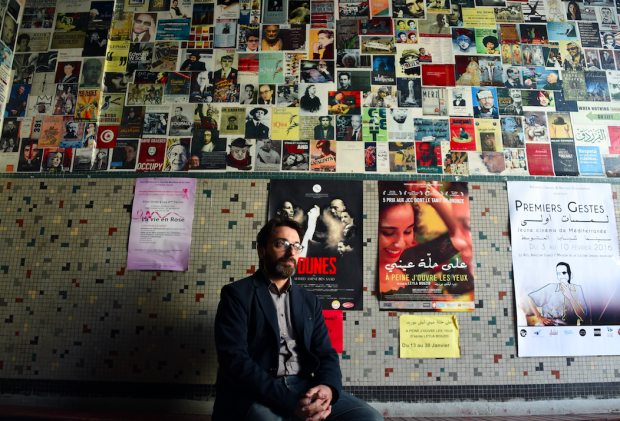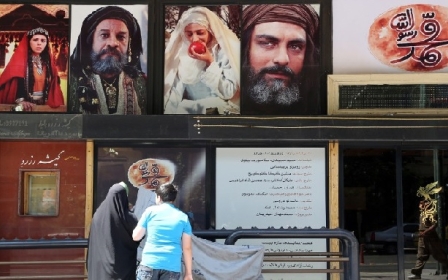Tunisian film opens Berlin festival as Clooney vows action on refugees

A love story set against the aftermath of Tunisia's watershed revolution will kick off the competition at the Berlin film festival Friday as the first Arab contender in two decades.
Hailing from the North African country that triggered the Arab Spring, Hedi is the debut feature-length film of Tunisian filmmaker Mohamed Ben Attia.
It is the first film in Arabic and set in the Arab world since 1996 to vie for prizes at Europe's first major cinema showcase of the year.
Its tale of "emotional upheaval" echoes Tunisia's recent history, said Ben Attia, who turns 40 this year. But rather than impart a political "message", his movie describes a kind of personal revolution.
"It's not that I'm not ambitious, but I never imagined going to Berlin! All of us are surprised," Ben Attia told AFP.
It is a rare achievement for any first-time filmmaker to be invited to the Berlinale competition.
The only other debut feature in the race this year - British theatre director Michael Grandage's Genius - has an all-star cast including Colin Firth, Jude Law and Nicole Kidman.
Hedi will have its world premiere as one of 18 films from around the world vying for the festival's Golden Bear top prize, with three-time Oscar winner Meryl Streep heading up the seven-member jury.
Streep told reporters before the opening that she was familiar with world cinema, and particularly films from Africa and the Middle East, having recently watched the Jordanian film Theeb about a Bedouin boy and Timbuktu about militants taking over the fabled Malian city.
"The thing that I notice is that there is a core of humanity that travels right through every culture and after all we're all from Africa originally, you know we're all Berliners, we're all Africans, really," she said.
Wake-up call
The film's main character Hedi - whose name means "serene" in Arabic - "isn't unemployed, his family doesn't have any money problems... but he feels out of place in society", Ben Attia said.
When he meets a tour guide called Rim and love strikes, Hedi (played by Majd Mastoura) begins to ask serious questions about the man he wants to be and his role in society.
Ben Attia said he himself used to be a "conformist", selling cars for a living before launching into filmmaking.
The wake-up call came on 14 January 2011 standing in the crowd outside the interior ministry demanding the removal of longtime strongman Zine el Abidine Ben Ali.
It was the end of an era "under censorship that we thought was only political, but in fact was (also) sedating everybody," he said.
Protests swept Tunisia in late 2010 after the death of a street vendor who set himself on fire in protest at unemployment and police harassment, leading Ben Ali to flee the country.
In his own "emotional upheaval" alongside the tumult wrought by the revolution, Hedi "discovers himself through a love story" and "detaches himself from conventions".
He realises "he has another choice - but then, after the euphoria, he discovers it's not all that easy," Ben Attia said.
Tunisia is hailed as a rare success story of the Arab Spring, although authorities have failed to improve the economy or do much to ease social exclusion, with security also hard hit in recent months.
Authorities last month imposed a nationwide curfew to curb some of the worst social unrest since the revolution.
"It's true we have a bit of a hangover," Ben Attia said. "We thought he (Ben Ali) just needed to leave for it all to get better.
"We truly believed in this radical change, just as Hedi wants to believe in his love story."
Political instability and the rise of groups like the Islamic State have taken their toll on Tunisia's vital tourism sector.
In the film, after Rim (played by Rim Ben Messaoud) loses her job, the lovers start thinking about quitting the country.
But the director said he has never contemplated leaving, especially as Tunisian films make waves abroad.
"Tunisian cinema has been on the move. We've seen films that stand out, that are well received abroad and at home," he said.
Tunisian director Leyla Bouzid's film As I Open My Eyes won the top award for fiction feature at the Dubai Film Festival in December.
Clooney to do more for refugees
Two-time Oscar winner George Clooney opened the Berlin film festival on Thursday with a spotlight on Europe's refugee influx, spurred by the wars in the Middle East and North Africa.
Clooney came to the German capital with his wife Amal, a Lebanese-born human rights lawyer, and co-stars Channing Tatum, Tilda Swinton and Josh Brolin who star together in new Coen brothers movie Hail, Ceasar!
He told reporters he would meet with German Chancellor Angela Merkel and, separately, a group of asylum seekers on Friday "to talk about and ask what messages and what things we can do... to help".
Clooney said he was keen to add star power to help with the refugee crisis which saw more than a million asylum seekers attempt the perilous sea crossings in order to enter Europe in 2015.
Although the 11-day Berlinale is spotlighting around a dozen films focused on refugees, Clooney admitted it would take time before Hollywood would turn its attention to such stories.
"The unfortunate thing about the film community is we react to situations much more than we lead the way. News stories have to continue to happen and then scripts are written and it takes a couple years before people are actually making films about it," he told reporters.
"It's also very difficult to just make a subject film. You have to have a reason - a character and a reason to make it."
Middle East Eye propose une couverture et une analyse indépendantes et incomparables du Moyen-Orient, de l’Afrique du Nord et d’autres régions du monde. Pour en savoir plus sur la reprise de ce contenu et les frais qui s’appliquent, veuillez remplir ce formulaire [en anglais]. Pour en savoir plus sur MEE, cliquez ici [en anglais].





